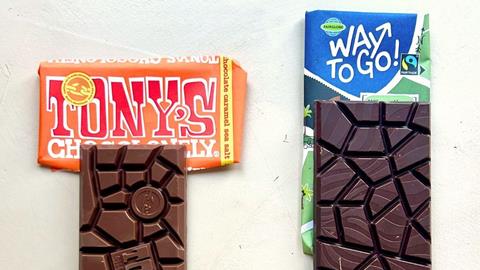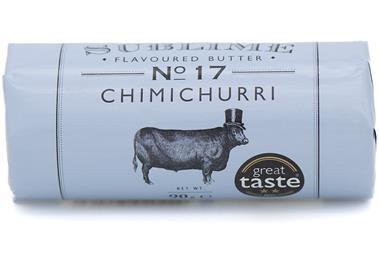Both Aldi and Lidl have made headlines this month by mimicking a well-known chocolate brand. While it may not be the first time for either, there is a difference on this occasion.
Aldi’s Choco Changer and Lidl’s Way To Go bar both take styling cues from Tony’s Chocolonely. The brand, known for its ethical sourcing standards, reflects the inequality of the supply chain by designing its chocolate in unequally sized and shaped sections.
Yet both have had a very different response from Tony’s. While Lidl’s Way To Go came under fire from the brand last week, there has been no such criticism of Aldi’s Choco Changer, which came back into stores as a limited-time Specialbuy last Thursday.
There is a clear reason why. Aldi adopted the design with Tony’s approval – which it gained by explicitly adopting its sourcing principles. It is a member of the ‘Tony’s Open Chain’ initiative, which aims to get bigger operators on board with its mission to end exploitation in cocoa supply.
Among other things, it means Aldi has committed to paying farmers in Ghana and Ivory Coast a living income price for all cocoa used in the bar. The principles also include trading directly with farmers to ensure traceability, and investing in skills and innovation to improve sustainability.
Lidl, on the other hand, is not a member of Tony’s Open Chain, and – as The Grocer revealed last week – has not acted with the brand’s approval. So it “doesn’t feel right” for Lidl to copy its design, a Tony’s spokesperson said.
Still, Lidl’s own sourcing claims for the cocoa used in its bar appear – on paper, at least – a match for many of Tony’s. Among them, Lidl commits to paying cocoa farmers a Fairtrade premium on top of the Fairtrade minimum price.
What’s more, it pays an “income improvement premium” based on Fairtrade living income figures that is paid directly, while also financing projects to empower small-scale farmers. Lidl says it extends that approach to other supply chains including those of coffee, cashews and orange juice, in collaboration with Fairtrade.
So, what is it that “doesn’t feel right” about this particular episode of brand mimicry?
The sticking point is the motive in Lidl mimicking Tony’s design without approval. Let’s face it, the unequal sections of chocolate are not exactly convenient from a consumption point of view, and no cocoa farmers are benefiting directly from the design.
When discounters mimic well-known brands without their approval, they do it through commercial self-interest. They hope to boost sales by cheekily indicating to shoppers which leading brand they are copying – crucially, at a cheaper price.
Many consumers are perfectly happy about that, and even celebrate it, when the target is one such as Pringles, Kellogg’s, Marmite or Nutella.
But when it comes to a brand like Tony’s, which has worked hard to define itself by ethical standards first and foremost, the tactic feels a bit more cynical. And although Lidl’s sourcing standards could be utterly beyond reproach, philanthropy and cynicism don’t sit well together.
It’s a point that no doubt was noted by Aldi, which launched its Specialbuy chocolate just two days after Lidl’s came under fire from Tony’s.
It means that, at least until Aldi’s bar is gone again, shoppers can vote with their feet on which feels most right to them.

He’s responsible for covering the discounters and retail property, and for commissioning and editing The Grocer’s analysis features. He has over 20 years' experience as a journalist, during which his by line has appeared regularly in a range of national newspapers.
Follow Steve on Twitter: @Steve_Farrell_ View full Profile
























No comments yet